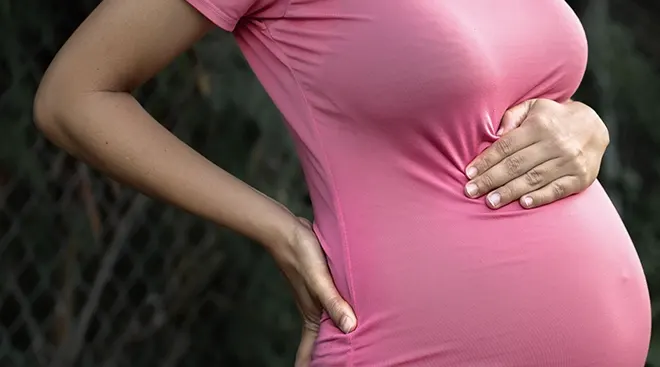Why You Might Have a Metallic Taste in Your Mouth in Early Pregnancy
Pregnancy is full of bizarre symptoms, (hello, nasal congestion and brain fog—so random!). One of the first things you might notice once you’ve gotten a positive pregnancy test is a faint metallic taste in your mouth. If you wake up one morning feeling like you’ve been drinking a penny cocktail all night, you’re not imagining it. That pregnancy metallic taste is a relatively common condition called dysgeusia.
Here, we’ve consulted with a few experts in order to fill you in on everything you need to know about this strange pregnancy symptom. So if you’re experiencing a pregnancy metallic taste, you’ve come to the right place. Read on for the scoop, and get some tips on how to diminish the bad taste in your mouth during pregnancy.
“Dysgeusia is a common condition some pregnant individuals experience during their first trimester,” says Christine Kingsley, APRN, a nurse who treats patients with various lung diseases and the health and wellness director at the Lung Institute in Manchester, Connecticut. “Dysgeusia and other taste impairments during pregnancy are not [dangerous] conditions, but they’re annoying and can lead to appetite changes or loss.”
In the first trimester of pregnancy, hormones begin to surge, which causes the onslaught of symptoms you’ll begin to experience—including that pregnancy metallic taste, as well as sore breasts and increased fatigue. The same hormones that kick off morning sickness, like progesterone, estrogen, prolactin and human chorionic gonadotropin (hCG), are also responsible for that bad taste in your mouth in pregnancy, says Kingsley. “This change and increase in sensitivity to certain flavors is considered an evolutionary response, making pregnant individuals become more wary of foods that can be harmful to them,” she says.
If you’re experiencing a metallic taste in your mouth during pregnancy, you can almost bet that it’s a result of those crazy hormones. But, while much more rare, there are a few other causes to be aware of, according to Kingsley:
- Certain medications
- Gastrointestinal issues
- Central nervous system disorders
- Upper respiratory infections
- Oral health issues
- Diabetes
- Kidney or liver disease
- Cancer
To play it safe, it’s best to consult your provider if you’re experiencing a pregnancy metallic taste or any other confusing symptoms.
Not all pregnant people will experience a metallic taste in their mouth. Just like morning sickness, it’s a symptom that can hit some and not others, and can even occur in one pregnancy but not a subsequent one. In general, though, pregnant people who experience dysgeusia will notice it pretty early on.
So if you’re wondering, ‘When does the metallic taste start in pregnancy?’, know that it’s most often a first-trimester symptom, says Jason Collier, DDS, who practices at the Southern Dental Implant Center in Cordova, Tennessee. “Pregnant people can start experiencing dysgeusia at different times, but it often begins in the first trimester, around the sixth week of pregnancy. However, some individuals may notice it even earlier or later in their pregnancy journey,” he says.
Is a metallic taste in your mouth an early pregnancy sign?
Many people wonder if a metallic taste in the mouth is an early sign of pregnancy. Since it can begin as early as week six of pregnancy (or even before!), many people do experience dysgeusia as one of the earliest signs of pregnancy, says Collier—but it’s not a definitive indicator that you’re pregnant. However, if you’re experiencing this symptom along with sore breasts, increased fatigue and a missed period, it may be time to take a pregnancy test.
Especially if you’re already dealing with morning sickness and other symptoms, having a metallic taste in your mouth in early pregnancy can be annoying. After all, you may already be struggling with eating as a result of nausea and food aversions. Now, anything you actually want to eat might taste odd or flavorless as a result of the metallic taste. But rest assured that like most early pregnancy symptoms, dysgeusia often fades away once the second trimester begins, says Kingsley.
Despite that, says Collier, “some individuals may continue to experience a metallic taste throughout their entire pregnancy. The good news is that it typically resolves on its own after childbirth. If it persists or becomes particularly bothersome, it’s a good idea to talk to your dentist or doctor to rule out any underlying issues.”
Is there a way to get rid of that pregnancy metallic taste? According to Collier, “there isn’t a surefire way to completely eliminate the metallic taste during pregnancy, as it is largely driven by hormonal changes.”
Despite that, there are some things you can do that could help reduce the taste until it fades away on its own. We’ve listed a few potential metallic taste remedies below:
- Maintain good oral hygiene. Brushing and flossing, as well as cleaning your tongue, can cut down on the pregnancy metallic taste, Kingsley says.
- Change your mouthwash. Mouthwashes with alcohol can sometimes exacerbate the metallic taste in your mouth in early pregnancy, says Collier. Instead, switch to a mild, alcohol-free mouthwash for a while.
- Try citrus foods. Avoid spicy foods, which can make the metallic taste more pronounced, advises Collier. “Instead, opt for tart or citrus-flavored foods to counteract the metallic taste.”
- Try a home remedy. The American Pregnancy Association (APA) recommends the following concoction before meals in order to reduce the metallic taste in your mouth: Rinse your mouth with a combination of half a teaspoon salt and half a teaspoon baking soda in one cup of warm water.
While that pregnancy metallic taste might be extremely annoying, it’s usually nothing to worry about—and it will resolve itself soon enough. However, if you have any questions at all, be sure to check in with your medical provider.
Please note: The Bump and the materials and information it contains are not intended to, and do not constitute, medical or other health advice or diagnosis and should not be used as such. You should always consult with a qualified physician or health professional about your specific circumstances.
Plus, more from The Bump:
Jason Collier, DDS, is an implantologist who practices at the Southern Dental Implant Center in Cordova, Tennessee. He obtained his doctoral degree in dental surgery from the University of Tennessee College of Dentistry.
Christine Kingsley, APRN, is a nurse who treats patients with various lung diseases and the health and wellness director at the Lung Institute in Manchester, Connecticut.
American Pregnancy Association, Dysgeusia Symptoms and Remedies
Learn how we ensure the accuracy of our content through our editorial and medical review process.
Navigate forward to interact with the calendar and select a date. Press the question mark key to get the keyboard shortcuts for changing dates.




















































